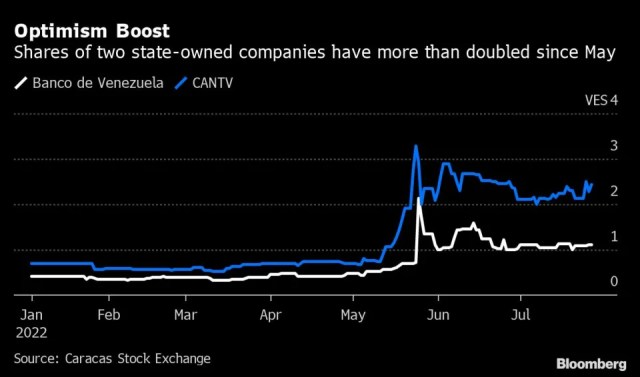
Venezuela’s stock market was derided by the late President Hugo Chávez as a tool of the rich, pummeled by years of recession and avoided by international investors as the nation’s currency became nearly worthless.
By Yahoo Finance – Nicolle Yapur
Aug 1, 2022
But in his attempt to resuscitate the economy, Chávez’s hand-picked successor is making amends with one of the institutions most battered by years of socialist policies. In an about face, President Nicolás Maduro plans to sell slices of the government’s stakes in state-owned companies through the stock exchange.
The move, while modest in scope, is dripping with symbolism and in line with Maduro’s push to energize the deeply damaged economy by allowing more free-market enterprise. Already he’s made progress shoring up the bolivar and wringing out some modest growth in a country that saw poverty and hunger explode during decades of socialist policies.
In coming weeks, the government will offer 5% stakes in lender Banco de Venezuela and fixed-line phone and internet service provider Cantv. More such listings could follow as the government seeks to raise cash.
The most enticing target could be companies tied to oil, gas and petrochemicals which, according to Maduro, could follow suit. Offering shares would be a game changer for Venezuela’s most important industry, allowing the businesses more independence as the government’s stake shrinks, according to Tamara Herrera, an economist and director of Venezuela research group Sintesis Financiera.
Venezuela’s hydrocarbons law states that energy companies must be majority owned by the state, so that would need to be changed for the government to sell off controlling stakes. It’s not clear that Maduro’s administration would allow that, given that he and his allies often speak about how Venezuela’s natural resources belong to its citizens.
The Banco de Venezuela sale is likely to come first. The lender’s most recent financial statement shows profit jumped 70% in dollar terms in the first half from a year earlier. The latest data showed it had 15 million customers and a 26% market share.
Cantv is more of a question mark. It recently selected brokerages to act as structuring agent and bookrunner, but the most recent financial statement is from the end of 2020, when it swung back to a profit after losses in 2019. Service has suffered amid years of disinvestment and infrastructure theft, while its fees remain heavily subsidized.
Both companies have ping-ponged back and forth from state control to the hands of private investors. Cantv was first acquired by the Venezuelan state in the 1950s, then got privatized in the 1990s. Chávez took it over again in 2007. Banco de Venezuela was bought by Spain’s Grupo Santander in the 1990s. Then Chavez nationalized it in 2009.
Cantv and Banco de Venezuela each have a small number of shares already trading on the bourse, and the price shot up after the government announced its plans for a stake sale in May. Cantv is up 227% since then, while Banco de Venezuela has gained 109%. Cantv’s market value is $331 million, while the lender’s is $695 million.
US Sanctions
Government officials spearheading the asset sales haven’t publicly stated the rationale for the plan, but Maduro has said capital was needed for developing public companies and acquiring new technology.
The first equity sales are likely to draw limited interest as they will be priced in bolivars and foreign investors are restricted by US economic sanctions. There’s also a dearth of financial data available for the companies, and of course very few analysts to provide advice to anyone considering an investment. The government says the price will be determined by the market.
In recent years, the stock market has mostly served Venezuelans with money trapped in the country. Thy buy equities to try to offset the impact of inflation and the tumbling value of the bolivar, which lost 99% in the last three years. The market has delivered as a hedge, with a benchmark index up in nominal terms more than 160,000% in 2018, 5,000% in 2019, 1,000% in 2020 and 300% last year.
The government’s plan to list shares meshes with other more open policies it’s implemented in recent years, such as allowing foreign-currency transactions and easing price controls. Still, the potential is limited by the sanctions that will prevent US investors from participating in the market.
“The message from the government is that they are willing to allow support between the private and public sectors,” said Juan Domingo Cordero Osorio, president of brokerage Rendivalores. “What we are experiencing is irreversible.”
Venezuela’s economy is still struggling, with gross domestic product now one-third of what it was when Maduro took office nine years ago. Parts of Caracas still feel emptied out by the mass emigration seen over the past few years as workers sought better opportunities in Colombia, Spain or the US.
But for Pulido, the head of the stock market, the planned share sale is an encouraging sign. He expects more equity issuance to follow and thinks it could help Venezuela shore up its economy.
“It is a first step,” Pulido said. “The government needs to provide legal safety for this plan to be successful. The stock exchange offers both legal and operational safety.”
…
Read More: Yahoo Finance – Maduro embraces Stock Market in latest Venezuela Nod to Normalcy
…

